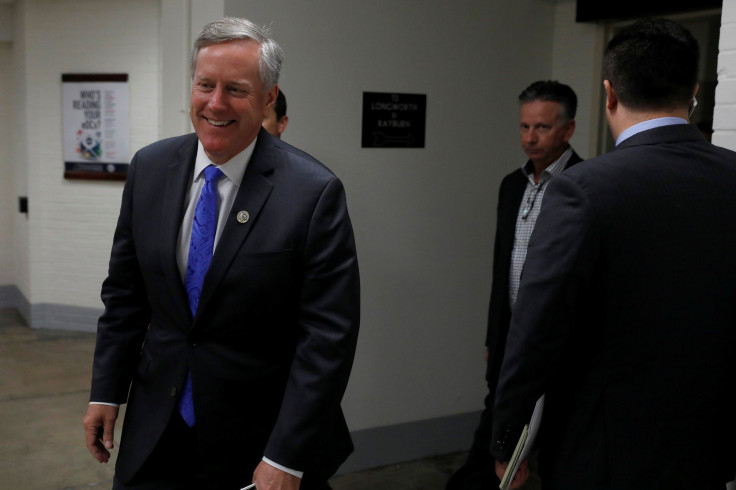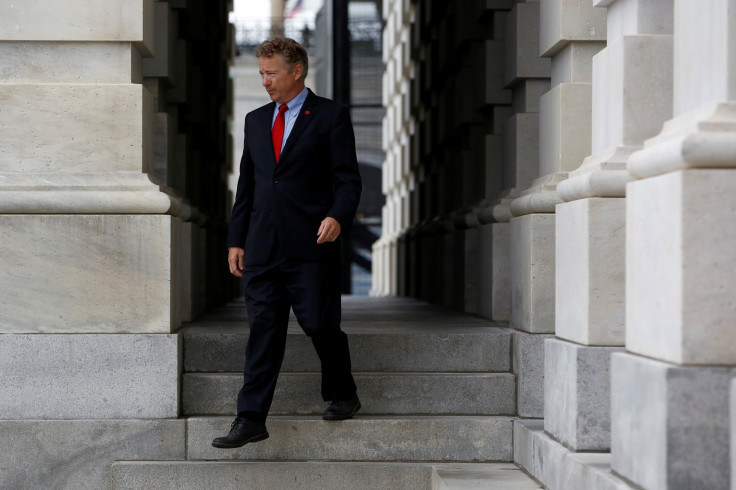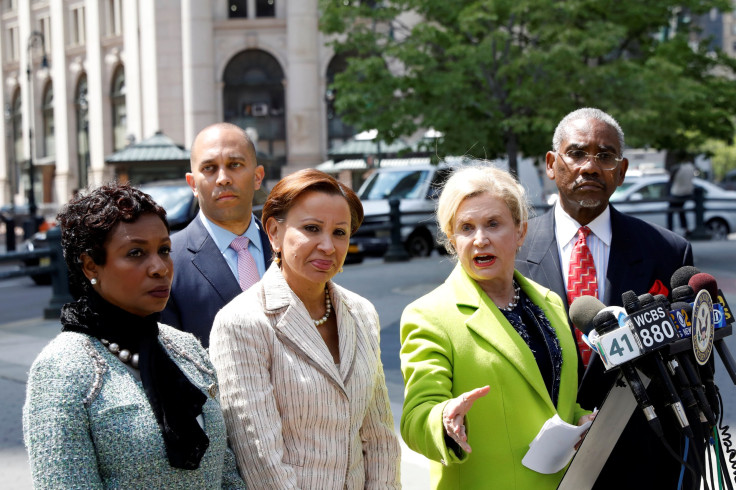Trump Tax Plan Could Make It Easier To Hide Money In Offshore Accounts

In early 2009, the Swiss bank UBS agreed to pay a $780 million fine for helping tens of thousands of Americans use secretive offshore accounts. But the fight against the use of foreign tax havens — like the ones populating the Panama Papers, released about a year ago — didn’t end there. A year later, then-President Barack Obama signed a new law, which passed by a 70-28 Senate vote, that tightened Internal Revenue Service requirements for Americans who hold their assets overseas. It’s known as the Foreign Account Tax Compliance Act (FATCA), or, as its opponents sometimes call it, the “Fat Cat” Tax Act. If those opponents have their way, its repeal might make it into the new administration’s tax reform bill by this summer.
FATCA is not a new tax but an additional reporting mandate for people with overseas assets; it closed loopholes left open by previous offshore account reporting rules and applies to the relatively well-off. For Americans living abroad, single filers with more than $200,000 in financial assets in foreign banks and married joint filers with at least $400,000 in foreign accounts must file an additional form with the IRS. Among those living in the U.S., the foreign account threshold is lower, at $50,000 for single filers and $100,000 for joint filers. Under agreements with foreign governments, banks in those countries must report those assets to the IRS as well, or face a 30 percent withholding penalty.
The IRS began implementing the law only in 2014, so its benefits have been tough to measure. The agency released a report in October touting $10 billion won back in tax revenues since 2009, but bundled the gains from FATCA with other, slightly older measures encouraging tens of thousands of foreign account holders to report their offshore assets voluntarily. A 2010 Joint Committee on Taxation report estimated FATCA would rake in more than $8.7 billion per year between 2010 and 2020, but that projection could easily have been rendered inaccurate by the series of delays in the law’s implementation. Estimates of annual U.S. government tax losses to offshore havens range from $35 billion to as much as $70 billion, though it’s unclear how much of that is captured by FATCA.
But as with the debates over gun control, National Security Agency surveillance and airport security, the dispute over this regulation often comes down to whether it’s better to be safe than sorry, and whether monitoring or implementing restrictions on some activity will only make things worse for law-abiding citizens — without changing anything for actual criminals. More specifically in this case, are the costs of compliance with FATCA really worth what is, as of now, an ambiguous amount of recovered taxes on previously-sheltered accounts? And does it effectively target those secretive account holders in the first place?
Researchers from the University of California, Berkeley, the University of Copenhagen, the University of Michigan and the IRS are working to at least answer the first question. Their estimates, which one of the study authors, Berkeley post-doctoral scholar Daniel Reck, said are “very preliminary,” peg the benefits of the law at more than $1 billion annually. In their analysis of pre-FATCA data on voluntary foreign account disclosures, they’ve also noticed some interesting characteristics among the accountholders: The “quiet disclosures” prior to FATCA, Reck said, are from “mostly U.S.-based” account holders with “high-value accounts” containing upwards of $1 million, and the accounts were largely concentrated in regions known to be tax shelters, like Switzerland and the Cayman Islands.
Reck, who will have to deal with the FATCA filing requirement when he joins the faculty of the London School of Economics as an assistant professor in the fall, and his colleagues are rushing to finalize their numbers by this summer, when the law could be rolled back. Republicans in the House and Senate have put forward repeal bills. A slew of op-eds, including from the Wall Street Journal’s editorial board, have bashed the law. A credit union trade group, insurance companies, an accountant trade group, a securities industry trade group and several banks have collectively spent millions in the past couple of years on lobbying efforts related at least in part to the law. A media and lobbying campaign, spearheaded by the financial advisory company deVere Group and the lobbying firm Global Strategic Communications Group (GSCG), is seeking to grab the attention of the Trump administration and Congressional leaders.
Jim Jatras, the managing director of GSCG, said he “can’t get into details” about his campaign’s specific work to win the administration’s support, but was “hopeful” that a repeal would make it into Trump’s expected tax plan, which Treasury Secretary Steven Mnuchin said would likely pass before the August recess.
Treasury Secretary Mnuchin: We're committed to 'very significant' tax reform by August recess https://t.co/W7XKPexFYo pic.twitter.com/1lqCZwPbGY
— CNBC (@CNBC) February 23, 2017
“We know Reince Priebus is in support of a FATCA repeal,” Jatras said, referring to Trump's chief of staff. He added that his campaign was “hoping for a response” to a letter from two lawmakers urging Mnuchin and Office of Management and Budget Director Mick Mulvaney to essentially nullify the law. The campaign has sent its own repeal letter to Congressional leaders as well, in conjunction with a litany of libertarian think tanks and advocacy groups that signed on.
The two congressmen, Rep. Mark Meadows (R-NC) and Sen. Rand Paul (R-KY), introduced twin repeal bills in their houses of Congress April 6, and the former lawmaker held a hearing on the “unintended consequences” of FATCA on April 26. Americans living outside the U.S., opponents of the law say, are the predominant sufferers of those consequences.


“It’s kind of like an argument for Prohibition. You could say alcohol causes these problems, but should you get rid of alcohol altogether?” Jatras said. “You shouldn’t be blanket-collecting information on people who haven’t done anything… Here’s a crazy idea: Get a warrant, get a cause and do what you do with any other criminal investigation.”
Like that of many major policy overhauls, FATCA’s implementation was a bit clunky. An IRS Taxpayer Advocate Service report documented FATCA-related expenditures of $100 million on what it described as mostly dysfunctional data management programs. One FATCA enforcement error, for example, resulted in 102,000 frozen refund claims from non-resident aliens with bank accounts in their home countries. The law, according to the report, “fell especially hard on international students, who, as a category, generally seek small-dollar refunds and represent a particularly low-risk taxpayer group,” the report said.
Indeed, U.S. citizens living abroad often run into issues related to compliance: They fear penalties in the event that they don’t follow the rules and have been turned away by foreign banks that don’t want to deal with the extra paperwork or have yet to fully comply, FATCA opponents say. Those opponents often point to a rise in the number of U.S. citizenship renunciations over the past several years, to 5,411 in 2016 from 3,415 in 2014, as evidence that compliance has become too burdensome. (The number has been going up since before the law’s implementation, however, and even at its 2016 high, represents 0.06 percent of the 9 million Americans living outside the U.S.)
Charles Bruce, who serves as legal counsel to American Citizens Abroad and specializes in tax compliance, said he’d worked with people who’d contacted him through the advocacy group after considering renouncing their U.S. citizenship to avoid the possibility of unknowingly breaking IRS or Treasury rules. One woman living in Scotland, for example, feared she would’ve had to pay an exhorbitant fee to see a specialist who could make sure she properly complied.
“That didn’t help her sleep well at night, having to worry, was she doing the right thing,” Bruce said. “I do remember her saying to me that she would like to keep her U.S. citizenship if she could. She liked America, and it made her a little sad.”
Still, he said, those fears are often a bit overblown, those renunciations stem from a lack of understanding of the system and it's easy to find a reasonably-priced tax return preparer, especially since "they are 'covered' by either or both foreign tax credits or the foreign earned income exclusion."
American Citizens Abroad, along with Rep. Carolyn Maloney (D-NY), who testified at Meadows’ hearing, have advocated for U.S. citizens living in foreign countries to be taxed by their countries of residence, a policy known as the same country exemption. (Currently, those citizens pay U.S. taxes on their foreign salaries, but with a foreign income deduction. Other countries, including many of the European Union member states, allow citizens to be taxed as nationals of the countries in which they reside, after they've lived there for an extended period.)

The foreign banks, Bruce said, were more open to Americans than they had been at the start of the law’s implementation, but probably wouldn’t condone the sort of behavior the law seeks to halt either way. Many of them and their representative trade groups — including the British bank Barclays PLC, Goldman Sachs Group., the Institute of International Bankers, Credit Suisse Securities, JPMorgan Chase and BlackRock Capital Management — collectively spent millions in lobbying related to FATCA in the period leading up to its enactment, but those names were largely absent from federal lobbying forms that listed FATCA as a lobbying issue in the past couple of years. The Securities Industry and Financial Markets Association, a trade group that spent millions in lobbying related to the law from 2009 to 2016, said in a statement that while its members “continue to have concerns” about the costs of compliance, it “continues to support strongly the objectives Congress was trying to achieve when it enacted FATCA.”
Bruce, the tax specialist working with American Citizens Abroad, said he didn't believe banks like HSBC were lobbying to have FATCA outright repealed, but changed.
“I believe banks want their business plan to be dealing with compliant customers,” he said. “You can’t help people cheat on their home country taxes. That’s not a good business to be in. It’s exactly the kind of ugly business that can ruin your reputation.”
Not everyone agrees with Bruce’s assessment of the banks’ motivations, and those of their customers.
“This was created when tens of thousands of bank accounts were created with the intention of hiding billions,” said Richard Phillips, a senior policy analyst at the non-profit Institute of Taxation and Economic Policy, a nonpartisan research organization. “The number-one beneficiary of repealing FATCA would be people evading taxes.”
Phillips dismissed anecdotes of Americans renouncing their citizenship status because of compliance costs, although he said the IRS form required by the law, the 8938, could be “harmonized” with an overlapping Treasury Department filing requirement to combat offshore bank secrecy.
“The real issue is not FATCA for those people — if you get rid of FATCA tomorrow, all those people abroad would still owe taxes,” he said. “FATCA is almost entirely about bank reporting. What the [foreign] banks are reporting is not a lot different from what people are already reporting — it just gives the government third-party verification.”
The same country exemption policy could easily be exploited, Phillips said. Americans could claim to reside in a nation with miniscule income taxes while not actually living there for much of the year, creating more potential for tax evasion or compliance issues.
Echoing Phillips’ worries about tax evaders taking advantage of a FATCA repeal, Clark Gascoigne, the deputy director of the Financial Accountability and Corporate Transparency (FACT) Coalition, pointed to the relatively larger wealth thresholds for people who have to comply with the law.
“$50,000 — that’s a pretty substantial chunk of change you have to have before you have to report on it,” he said. “This is not about privacy. It’s about tax evasion.”
After all, Gascoigne noted, more than 100 other countries have agreed to require their banks to report Americans’ assets to the IRS and have taken other broader initiatives to boost transparency.
“The rest of the world said, ‘This makes sense — if the U.S. is doing it, maybe we should do it too,’” he said.
But on the international front, many people on all sides agree: The U.S. government is hypocritical about the use of offshore tax shelters. One major takeaway from the Panama Papers was how frequently the U.S. appeared as a tax haven itself.

Dozens of countries have signed onto an international initiative similar to FATCA, known as the Common Reporting Standard (CRS) and developed by the Organization for Economic Cooperation and Development — but the U.S. has refused to sign on. CRS has a lower asset value threshold than FATCA and went into effect this year.
The intergovernmental agreements that make FATCA effective were supposed to establish a certain degree of reciprocity — namely, a requirement that American banks disclose information on their foreign customers’ accounts as foreign banks do for the IRS. But because of client privacy and confidentiality laws, American financial institutions aren’t providing the same information on foreigners’ assets to the very countries the U.S. is asking to have their banks do the same, making the U.S. a hub for tax shelters, as the Panama Papers demonstrated. Following Switzerland and Hong Kong, the U.S. is comes in third on the research and advocacy group Tax Justice Network’s Financial Secrecy Index.
It's true the US has been quieter than others re #panamapapers. But interesting to see this tax case, filed by the govt last June, citing MF pic.twitter.com/74I2AWjGzk
— Will Fitzgibbon (@WillFitzgibbon) May 9, 2017
That might explain why American banks, which often have international branches or subsidiaries but might enjoy a boost in the global competition for clients in the U.S., are mixed in their stances on the law.
“That’s certainly an advantage for U.S. banks,” said Reck, the Berkeley researcher.
He and his colleagues are rushing to complete their study while FATCA’s fate still hangs in the balance. But even without the finalized study's numbers, he noted, the law was based on common-sense principles.
“There are wealthy people who have complex assets and of course people who are trying to hide money abroad,” Reck said. Since FATCA's implementation, he added, “we’ve seen a little evidence of people closing their foreign accounts and bringing that back over. Once you can’t avoid the tax, it’s plausible that you wouldn’t have your money in a foreign tax haven.”
© Copyright IBTimes 2024. All rights reserved.






















